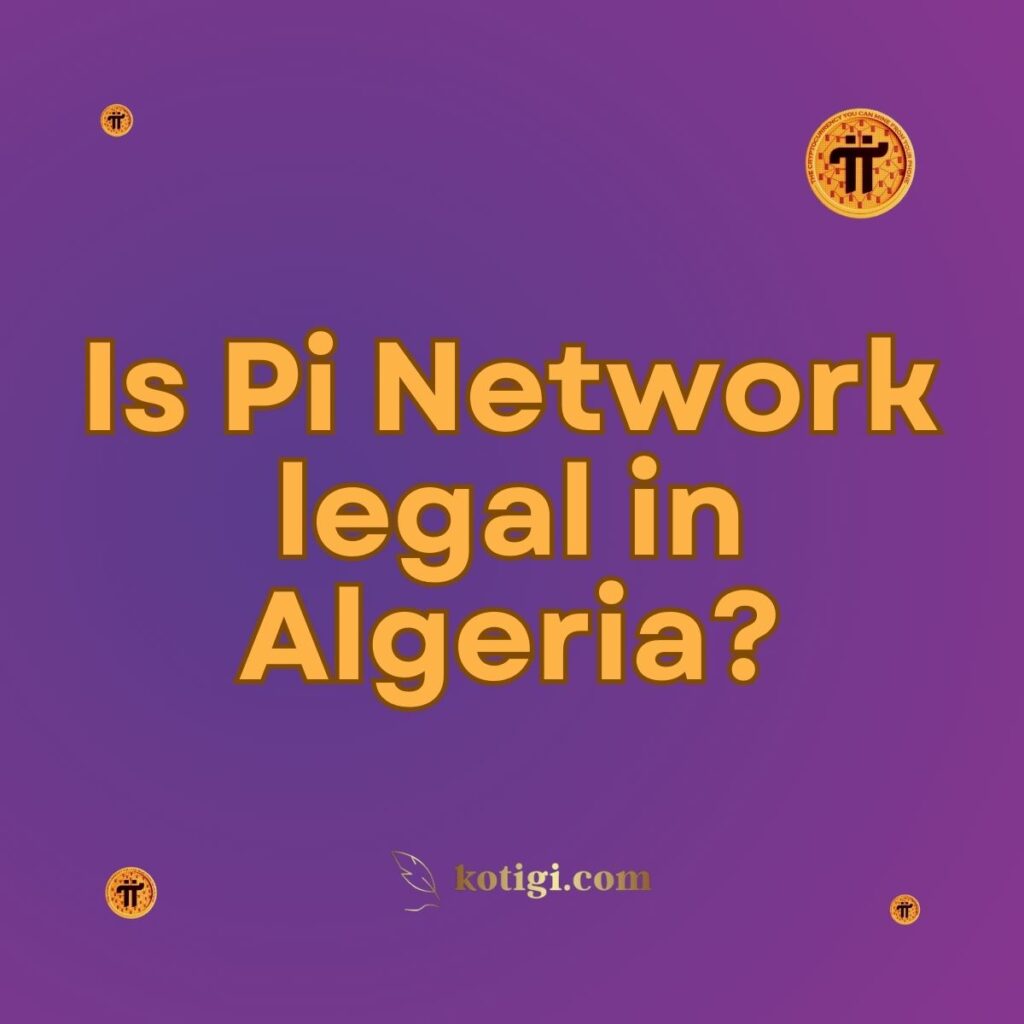
Is Pi Network legal in Algeria?
Pi Network operates in a challenging legal environment in Algeria due to the country’s 2018 ban on cryptocurrency use. Although Pi Network is not explicitly mentioned in Algerian laws, the general prohibition on cryptocurrencies makes the platform’s legal status uncertain. Algerian Pi Network users should be aware of the potential risks associated with the platform in light of the government’s strict stance on digital currencies.
Introduction
As cryptocurrencies continue to grow in popularity globally, different countries have adopted varying legal approaches to regulate their use. In Algeria, cryptocurrencies face significant regulatory hurdles, as the government imposed a blanket ban on their use in 2018. Pi Network, which operates within the cryptocurrency space, is part of a decentralized ecosystem that has attracted millions of users worldwide. However, its legal status in Algeria remains unclear due to the government’s firm position on cryptocurrencies. This article explores the legal framework surrounding cryptocurrencies in Algeria and the potential risks for Pi Network users in the country.
1. Algeria’s Ban on Cryptocurrencies
In December 2017, Algeria officially banned the use of cryptocurrencies, including their possession, trade, and usage as a form of payment. This sweeping ban creates a hostile environment for any digital currency platforms, including Pi Network.
1.1 Legal Framework for Cryptocurrencies in Algeria
The Algerian government’s decision to ban cryptocurrencies is rooted in the country’s desire to maintain control over its financial system. Cryptocurrencies, by their nature, operate outside of traditional financial regulations, which is seen as a potential threat to Algeria’s economic stability. The ban was officially enacted through the Financial Law of 2018, prohibiting the use of any form of virtual currency.
1.2 The Scope of the Ban
The scope of Algeria’s cryptocurrency ban is extensive, covering both possession and use of digital currencies. This includes buying, selling, or exchanging cryptocurrencies such as Bitcoin, Ethereum, and potentially even Pi. For Pi Network users, this legal framework makes it risky to engage in activities that involve mining or trading Pi coins within Algeria.
1.3 Enforcement of the Ban
While the ban on cryptocurrencies is well-documented, enforcement in Algeria has been inconsistent. There have been cases where individuals have faced penalties for violating the law, but much of the activity surrounding cryptocurrencies remains underground. Despite this, Algerian users of Pi Network should remain cautious due to the potential legal consequences.
2. Pi Network’s Legal Status in Algeria
Pi Network, although different in its operational approach compared to more established cryptocurrencies, still faces regulatory uncertainty in Algeria. The platform’s decentralized nature and the fact that it plans to introduce a cryptocurrency into circulation make its legal standing questionable under Algerian law.
2.1 Pi Network’s Position in the Cryptocurrency Space
Pi Network sets itself apart from traditional cryptocurrencies through its mobile-first mining process, which is less resource-intensive and accessible to a broader audience. However, as Pi Network moves closer to enabling Pi coins for transactions, it could fall under the same regulatory scrutiny as other digital currencies.
2.2 Gray Area in Algerian Cryptocurrency Laws
Pi Network exists in a legal gray area in Algeria due to the government’s broad interpretation of its cryptocurrency ban. While Pi Network users currently mine Pi without engaging in traditional financial transactions, the eventual use of Pi coins for trade or exchanges could put Algerian users in conflict with the law. Until there is further clarification from the Algerian government, the platform’s legal status will remain uncertain.
2.3 Risks for Pi Network Users
The legal risks for Pi Network users in Algeria revolve primarily around the country’s ban on cryptocurrency activities. Users who mine Pi could face potential penalties if the platform is deemed to fall under the country’s prohibitive regulations. Additionally, those who attempt to trade or use Pi coins in Algeria may risk legal repercussions if authorities take a strict interpretation of the law.
3. Government Concerns Regarding Cryptocurrencies
Algeria’s firm stance against cryptocurrencies stems from several key concerns that the government has about the impact of digital currencies on the economy and society. These concerns extend to any cryptocurrency platforms, including Pi Network.
3.1 Economic Control and Financial Stability
One of the primary reasons for Algeria’s ban on cryptocurrencies is the government’s desire to maintain control over the national economy and financial system. Cryptocurrencies, which function independently of central banks, are seen as a potential threat to this control. The decentralized nature of platforms like Pi Network could similarly challenge the traditional economic structure in Algeria.
3.2 Money Laundering and Fraud Risks
Cryptocurrencies are often associated with the risks of money laundering and fraudulent activities due to their anonymity and decentralized nature. The Algerian government has cited these risks as a justification for its ban. While Pi Network does not facilitate anonymous transactions in its current form, its eventual use as a currency may raise similar concerns in the eyes of regulators.
3.3 Consumer Protection Issues
Another concern for the Algerian government is the protection of consumers from the speculative and volatile nature of cryptocurrencies. With the value of many digital currencies fluctuating dramatically, users face the risk of significant financial losses. This concern may apply to Pi Network as well, especially as the platform transitions to a phase where Pi coins can be traded and used in transactions.
4. Potential Consequences for Pi Network Users in Algeria
Given the strict legal environment in Algeria, Pi Network users must be aware of the potential risks they face when participating in the platform.
4.1 Legal Penalties for Cryptocurrency Use
The Algerian government has made it clear that any engagement with cryptocurrencies, including their possession and use, is illegal. While Pi Network is still in its early phases, the eventual introduction of Pi coins as a currency could expose Algerian users to legal penalties. These penalties could range from fines to more severe consequences, depending on the scale of the activity and the government’s enforcement of the law.
4.2 Difficulty in Converting Pi Coins to Fiat Currency
Even if Pi Network users in Algeria are able to mine Pi coins, converting these coins into Algerian Dinars (DZD) or other fiat currencies would present significant challenges due to the cryptocurrency ban. Most cryptocurrency exchanges are either blocked or highly regulated in Algeria, making it difficult for users to legally trade or convert their Pi coins.
4.3 Increased Government Scrutiny
As Pi Network continues to grow in popularity, it could attract more attention from Algerian authorities. This may lead to stricter enforcement of the country’s cryptocurrency ban, with Pi Network users potentially facing increased scrutiny. As a result, Algerian users should remain cautious about their participation in the platform.
5. Future of Cryptocurrency Regulation in Algeria
Although Algeria currently has one of the strictest stances on cryptocurrencies, the future of cryptocurrency regulation in the country could evolve, especially as the global landscape changes.
5.1 Possibility of Regulatory Reforms
As cryptocurrencies become more accepted worldwide, there is a possibility that Algeria may reconsider its ban. Should global or regional trends shift toward more lenient regulation, Algeria may follow suit, introducing a framework that allows for controlled use of digital currencies. This could open up opportunities for platforms like Pi Network to operate legally in the country.
5.2 International Pressure and Regional Influence
Algeria’s cryptocurrency policies may also be influenced by international organizations and neighboring countries. If other nations in the Middle East and North Africa (MENA) region begin to adopt more progressive cryptocurrency regulations, Algeria could face pressure to adjust its stance. Global financial bodies such as the Financial Action Task Force (FATF) may also encourage Algeria to adopt a more balanced approach to cryptocurrency regulation.
5.3 Potential Impact of Blockchain Technology
While the Algerian government remains skeptical of cryptocurrencies, there is growing recognition of the potential benefits of blockchain technology. If Algeria sees value in adopting blockchain for various sectors, it may eventually differentiate between cryptocurrencies and blockchain applications, potentially providing legal space for platforms like Pi Network to operate.
6. Recommendations for Pi Network Users in Algeria
Given the uncertain legal status of Pi Network in Algeria, users should take steps to protect themselves from potential risks while participating in the platform.
6.1 Stay Informed About Legal Developments
Algerian Pi Network users should stay updated on any changes to the country’s cryptocurrency regulations. As the global and regional landscape evolves, legal frameworks may shift, offering more clarity or potential opportunities for Pi Network users.
6.2 Avoid Large-Scale Transactions
To minimize the risk of legal penalties, Pi Network users in Algeria should avoid engaging in large-scale transactions involving Pi coins. While mining Pi may not immediately trigger legal issues, converting or using Pi coins for financial purposes could expose users to penalties under Algerian law.
6.3 Seek Legal Advice
For those concerned about the legal risks associated with Pi Network in Algeria, seeking legal advice from professionals who are familiar with Algerian cryptocurrency laws is a prudent step. Legal experts can provide guidance on how to navigate the country’s strict regulatory environment and minimize the risk of legal consequences.
Conclusion
In Algeria, Pi Network operates within a challenging legal environment due to the country’s strict ban on cryptocurrencies. While Pi Network is not explicitly targeted by Algerian laws, its decentralized nature and potential use as a cryptocurrency place it at odds with existing regulations. Algerian users should remain cautious and informed about the risks they face when participating in Pi Network. As global trends in cryptocurrency regulation continue to shift, there may be changes in Algeria’s stance, but until then, Pi Network users must navigate a complex and uncertain legal landscape.
Key Takeaways
- Algeria has banned cryptocurrency use since 2018, making Pi Network’s legal status uncertain.
- Pi Network’s decentralized nature and future currency use place it in a legal gray area in Algeria.
- Users face potential legal risks, including fines and penalties, for participating in cryptocurrency activities.
- Algeria’s government remains concerned about economic control, money laundering, and consumer protection when it comes to digital currencies.
- Algerian Pi Network users should avoid large-scale transactions and seek legal advice to mitigate risks while staying informed about potential regulatory changes.





